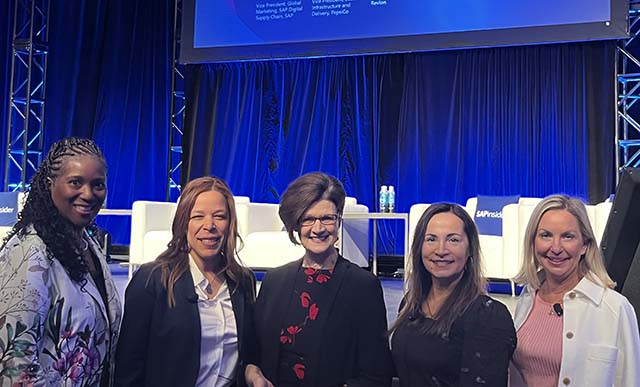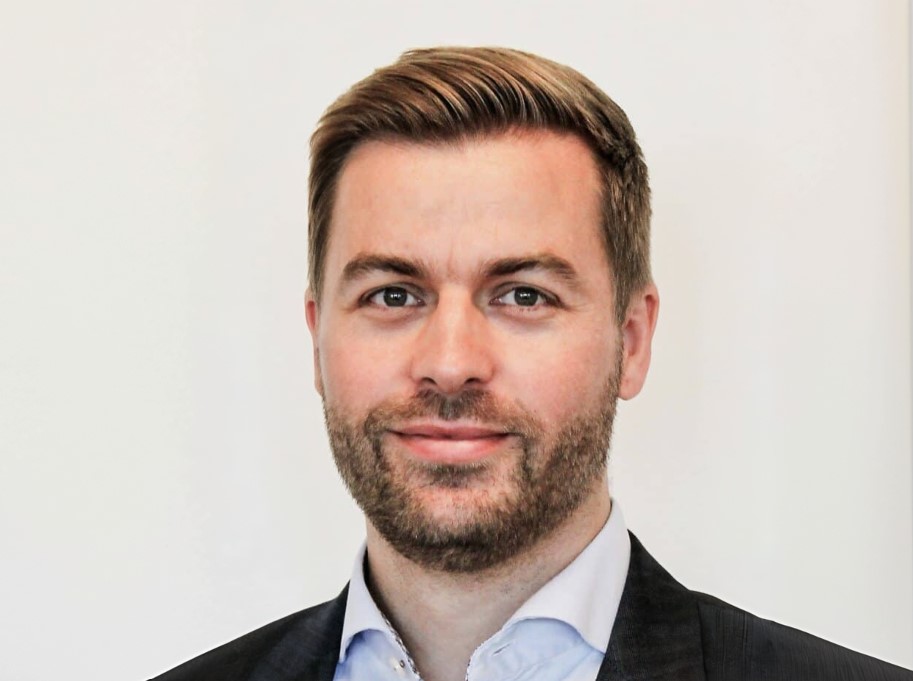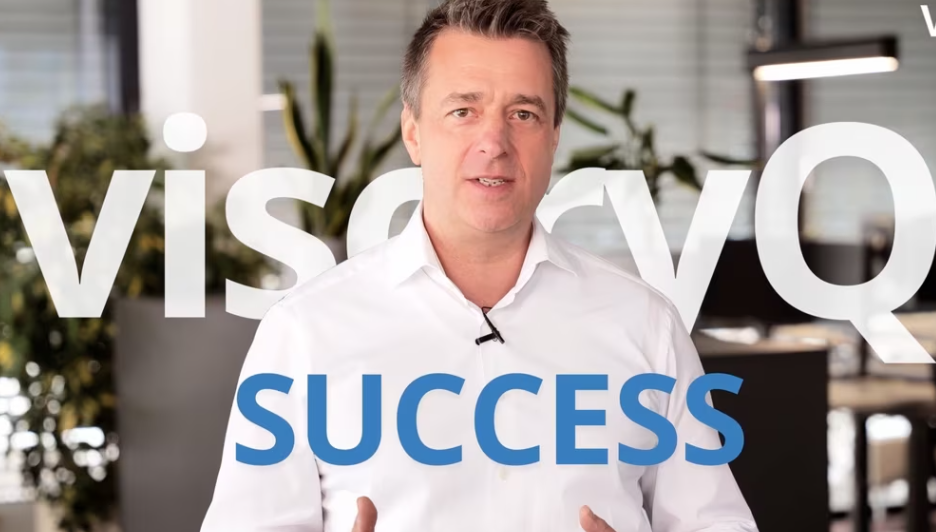It’s Not About the Metrics
In a keynote panel discussion moderated by
Maryfran Johnson, host of
CIO.com's CIO Leadership Live video/audio podcast, women in executive leadership roles spanning multiple industries, discussed DEI-related experiences and best practices. Panelists brought decades of experience and personal stories to the discussion where one paradigm was immediately addressed:
it’s not about the metrics. While metrics such as the percentage of women in leadership roles and racial diversity in leadership should be defined and executed, the panel was clear that emotional intelligence (EQ), psychological safety, mentorship, sponsorship, allyship, and cultures that foster presenting the whole self in the workplace are far more important.
Panelists Set the Tone for Diversity in Leadership and Diversity in Perspectives
In a keynote that marked the beginning of the second day of
SAPinsider Vegas 2023, the following dynamic group of leaders offered experience-driven, real-world perspectives:
- Mindy Davis, VP Global Marketing, Digital Supply Chain, SAP. Mindy, who joined SAP in 2004, was responsible for managing a shop floor team of 100+ resources in her first post-college job. On her first day, Mindy walked onto the shop floor to find her team appropriately wearing jeans and boots. Wearing a cream-colored suit and heels, she quickly changed into jeans and boots to set the tone for the culture she sought to curate.
- Fern Johnson, VP Sector Infrastructure and Delivery, PepsiCo. With 30+ years at PepsiCo and an acute familiarity with “beverages and chips,” Fern is responsible for global infrastructures and teams spanning continents, languages, and perspectives. She currently has two mentors and advises others to have multiple mentors since each one brings a different perspective. Fern, who is 5’11” and was once conscious of her height, was advised by her 4’11” mentor to “never play small.”
- Keila Lazardi, Chief Scientific Officer, Revlon. Keila, who has spent 25+ years in consumer product goods (CPG) and health industries, notes that there are no issues recruiting women at Revlon. Originally from Venezuela, Keila was told early in her career that her accent was too strong to advance her career. After meeting a male CEO with an even stronger Italian accent, she decided to use her voice.
- Elaine Montilla, Chief Technology Officer, Pearson, and founder, 5xMinority. Recently joining Pearson, Elaine is a multi-faceted thought leader and TEDx speaker. At 17, Elaine moved from the Dominican Republic to the United States and, like Keila, experienced communication challenges early in her career. Elaine is an advocate of bringing her whole self to work, noting that it is exhausting being different people in professional and personal spheres. When Elaine came out as an active member of the LGBTQ+ community at work, her productivity skyrocketed.
Enabling Diversity through Training, Education, and Action
While noting that PepsiCo is working toward specific managerial diversity targets, Fern Johnson described organizational DEI training as necessary to “strengthen the muscle.” Building on this, Elaine Montilla, who noted that education is at the heart of everything Pearson does, shared that her organization leverages a McKinsey accelerator program to promote underrepresented groups into leadership roles. Keila Lazardi added that Revlon has a dedicated program to provide DEI-related training, including education on bias.
Circling back to the metrics-focused DEI paradigm embraced by many organizations, Maryfran Johnson stated that having a “metrics target is good, but the important work is figuring out where diversity is.” Fern Johnson noted that PepsiCo may not typically be considered a target employer for science, technology, engineering, and math (STEM) graduates but that it actively works to change this through focused campaigns. Fern advocates for PepsiCo being a “tech destination.” She shared that the company has campaigns focused on hiring more women, graduates from historically black colleges and universities (HBCU), Spanish speakers, and “not just recruiting from traditionally white universities.”
Pivoting to diversity in leadership, Mindy Davis shared that SAP is doubling down on employee network groups (ENGs). SAP ENGs span members of Black, Latino/Latina, pride, women in leadership, and many other communities. Having served in a variety of leadership roles, Mindy emphasized that in addition to fostering these communities, she makes the effort to pay it forward in
how she leads, citing an executive who instilled confidence in her as a new graduate and later served as a mentor.
Encouraging Team Members to Bring Their Whole Selves to the Workplace
In discussing the importance of embracing all parts of ourselves and those around us, Elaine Montilla of Pearson noticed the exhaustion of being an active LGBTQ+ community member in her personal life and not sharing this part of herself professionally. When these parts were united, Elaine found that she was more authentic and productive at work. Outside of her role as CTO of Pearson, Elaine is leading the charge for bringing your whole self to the workplace via 5xMinority, her coaching and consulting business that targets the need for diversity in technology and larger STEM-spectrum fields.
Keila Lazardi of Revlon is also passionate about team members bringing their whole selves to the workplace. Raised in Venezuela, she understands what it is like to not have the same upbringing as others and seeks to prevent her team members from being singled out due to differences. During the interview process, Keila asks candidates who they are and how they adapt. She thinks about how candidates will help build a diverse culture. In that way, Keila sets the tone for her team in bringing their whole selves to work from the onset of embarking on new roles.
Fern Johnson of PepsiCo put a name to what seems to be a common tendency to exhibit different personas based on environment:
code switching. Underlining Elaine Montilla’s statement on how exhausting this can be, Fern also emphasized situational code switching. For example, she understands that shorter-term needs are equally critical and that code switching is often employed to manage circumstances of team members’ personal lives. For that reason, she asks her team to “bring their best self to work for the day” in a “this is enough for this moment” capacity. In turn, her team is able to better balance personal and professional priorities while not ignoring what is occurring in personal spheres.
Mentorship, Sponsorship, and Allyship
Facilitator Maryfran Johnson invited panelists to discuss perspectives and differences in mentorship, sponsorship, and allyship as women leaders in an industry that is historically male dominated. Mindy Davis of SAP discussed how impactful it was to have an executive mentor early in her career, stating that without this individual, she would not have had the confidence to be successful. Her mentor even coached Mindy as a new graduate to wear glasses in order to look older and garner respect from her team.
There was coalescence on having multiple mentors, yet Elaine Montilla of Pearson and 5xMinority emphasized that mentors do not replace working hard. Referencing her
TEDx on mentoring women and minorities in tech and differentiating between mentors and sponsors, Elaine stated that sponsors “put their neck on the line to open doors for others.” Fern Johnson of PepsiCo underlined this, stating that a sponsor “chooses you, gives you exposure, and helps you navigate forward.” Further differentiating between mentors, sponsors, and allies, Fern shared that a mentor is a coach, and an ally is someone who supports a holistic agenda. An ally, Fern stated, does not need to be in a particular cohort but needs to believe in a cause, speak up, and represent those who are in the cohort. Mindy Davis added that
SAP Chief Marketing Officer and Executive Board member Julia White has a talent for fostering allyship and in doing so is able to create an environment of trust and psychological safety.
Shifting to psychological safety, facilitator Maryfran Johnson stated that this concept was recently introduced in separate conversations—by male CIOs—who sought to foster environments of trust and safety in voicing different perspectives. Building on this, Keila Lazardi described a forum called “Tips and Tea with Keila” where themes of psychological safety are embedded into the discussion. In this forum, she guides Revlon team members through topics such as managing difficult conversations, career progression, and related topics over the span of 30 to 40 minutes.
Identifying and Embracing Differences
Throughout the panel discussion, themes of diversity in leadership and diversity in thought consistently overrode what we tend to observe in organizational DEI initiatives. With respect to diversity in thought, Maryfran Johnson stated that in journalism, she would look at “who is going to make the most trouble” in order to gain new perspectives. Similarly, Keila Lazardi of Revlon shared that when interviewing, she asks “who will be my change agent?” Keila added that given her extroverted nature, she seeks out introverts who will balance existing perspectives.
On a trip to Latin America (LATAM), Fern Johnson, a New Yorker who admittedly speaks quickly, realized that her Spanish-speaking LATAM team could not understand her. In this scenario, she was the minority. Placing trust in her team, she asked them to run the meeting in Spanish and let her know where they landed. Proving to be an effective method for decision-enablement and trust-building, Fern now follows this practice whenever she visits LATAM.
Where Organizations Miss the Mark
While organizations are making progress, there is clearly room for improvement in DEI initiatives. To gather insights on this, Maryfran Johnson asked the panel what mistakes are being made. Mindy Davis of SAP shared that initiatives without leadership support and those that are introduced by Human Resources departments “will not fly.” Fern Johnson discussed that there is “no blanket strategy.” She described a women-in-technology session held in India that became standing room only, thereby demonstrating the level of interest in this topic. Realizing how much this discussion was needed, Fern asked everyone to scream for the first minute of the meeting to release their frustrations.
Viewing career progression as a triangle where greater achievement is reached higher on the triangle, Fern shared that there is a large population that “stays in the bottom level.” This was particularly apparent among her India-based team and later led to an initiative called “We Inspire” to enable female Indian team members to collaborate and enable each other. This model later served as a model for a similar program in Mexico.
Building on how organizations miss the mark, Keila Lazardi of Revlon reemphasized that organizations miss the mark when DEI initiatives are focused on metrics. “This is just a start,” she said, adding that “the real challenge and target is culture at work.” Keila stated that organizations are often too narrow in their definition of diversity and need to incorporate more men in related initiatives. Adding to these misses, Elaine Montilla of Pearson and 5xMinority said organizations need to ask themselves, “What are your intentions of this program?” Elaine also discussed the importance of not having DEI leaders reporting to HR, ensuring that all stakeholders are engaged and enabling intersectionality since individuals often exist in multiple ENG groups.
When asked if they had a magic wand and could make one thing happen universally, panelists were enthusiastic in their responses:
- Fern Johnson: “Pay equity!” This received enthusiastic applause from the audience.
- Mindy Davis: “Psychologically safe environments.”
- Keila Lazardi: “Value who people are, not what they do.”
- Elaine Montilla: “Blind auditions,” or the practice of removing names from resumes before interviewing.
Finally, in a lightning round that concluding the discussion, Maryfran Johnson asked panelists to share their single best piece of advice to women in technology, women in leadership, and organizations as a whole.
- Elaine Montilla, Pearson: “Educate yourself. When you go back to work, find someone who does not look or sound like you, and mentor them.”
- Keila Lazardi, Revlon: “Do your homework, and define action barriers.”
- Fern Johnson, PepsiCo: “Become an ally for a young woman in tech.”
- Mindy Davis, SAP: “Recognize your own unconscious bias, and take action to change.”








